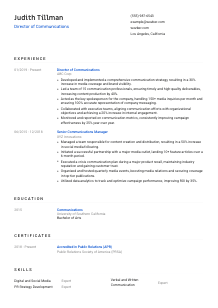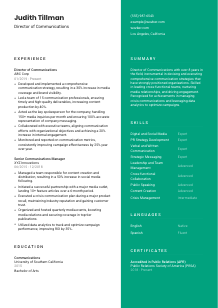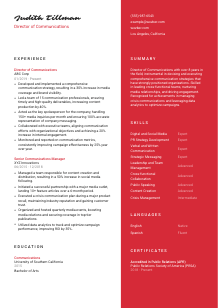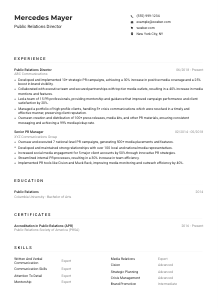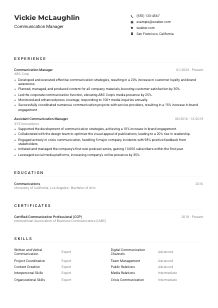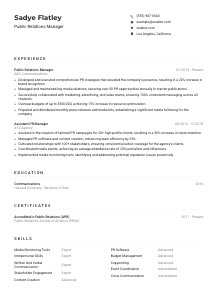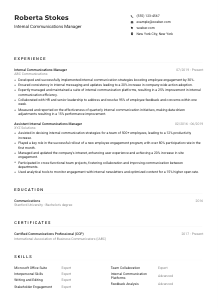Director of Communications Resume Example
Shouting strategies but your resume isn't broadcasting? Delve into this Director of Communications resume example, crafted with Wozber free resume builder. See how you can articulate your communication prowess in sync with job requirements, ensuring your career speaks as eloquently as your campaigns!
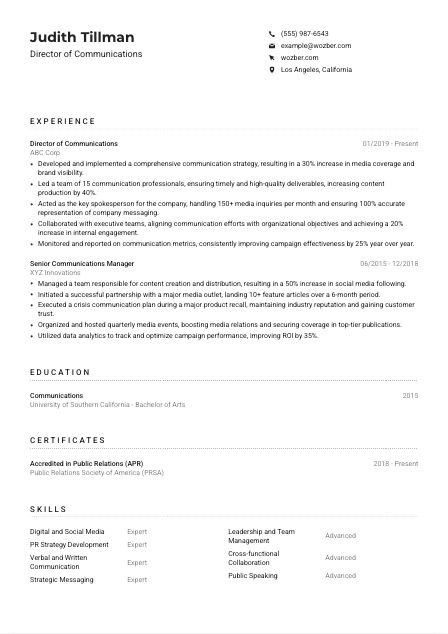
How to write a Director of Communications resume?
Congratulations, future Director of Communications! You're on the cusp of applying for a position that demands not just expertise, but a flair for creating impactful narratives. In the realm of communications, your resume isn't just a document—it's a showcase of your strategic thinking, leadership, and mastery over public dialogues.
With the Wozber free resume builder at your disposal, you'll discover how to meticulously tailor your resume to meet the specific needs of your desired role, ensuring it's optimized for Applicant Tracking Systems (ATS) using Wozber's dedicated ATS resume scanner. Let's begin this journey to articulate your storytelling prowess through a resume that speaks volumes.
Personal Details
The Personal Details section might seem straightforward, yet it's the cornerstone of making your resume resonate with the essence of a Director of Communications. It's time to set the stage for your narrative with precision and strategic alignment.
1. Brand Yourself With Your Name
Consider your name the headline of your professional story. Use a legible, professional font, making it stand out as the beacon of your personal brand. Remember, in the world of communications, presentation starts with how you introduce yourself.
2. Mirror the Position
Directly beneath your name, align your aspirations by stating your goal title, 'Director of Communications,' drawn from the job description. This alignment signals to the hiring manager that you're not merely looking for any role, but this role specifically.
3. Ensure Contact Clarity
Your phone number and email address are your open channels for dialogue—make sure they're clear and professional. Tip: A custom email address that incorporates your name exudes professionalism and shows attention to detail.
4. Localize Your Professional Presence
Being in Los Angeles, California, positions you perfectly for this role. Highlighting your location not only meets a specific requirement but reassures the hiring team of your availability and commitment.
5. Opt for a Professional Persona
If applicable, include a link to your LinkedIn profile or a professional website to provide a deeper insight into your career narrative. Ensure these are polished mirrors of your resume, rounding out your professional persona.
Takeaway
Your Personal Details section is your resume's firm handshake; it introduces your professional narrative and sets the tone for what follows. Craft this section to be an eloquent prelude to the symphony of your qualifications and experience. Let each detail resonate with your understanding of and suitability for the Director of Communications role.





Experience
The Experience section is your stage to not only showcase your career achievements but also to illustrate your expertise in storytelling and strategic communication. It's here that you prove your mettle as a seasoned Director of Communications.
- Developed and implemented a comprehensive communication strategy, resulting in a 30% increase in media coverage and brand visibility.
- Led a team of 15 communication professionals, ensuring timely and high‑quality deliverables, increasing content production by 40%.
- Acted as the key spokesperson for the company, handling 150+ media inquiries per month and ensuring 100% accurate representation of company messaging.
- Collaborated with executive teams, aligning communication efforts with organizational objectives and achieving a 20% increase in internal engagement.
- Monitored and reported on communication metrics, consistently improving campaign effectiveness by 25% year over year.
- Managed a team responsible for content creation and distribution, resulting in a 50% increase in social media following.
- Initiated a successful partnership with a major media outlet, landing 10+ feature articles over a 6‑month period.
- Executed a crisis communication plan during a major product recall, maintaining industry reputation and gaining customer trust.
- Organized and hosted quarterly media events, boosting media relations and securing coverage in top‑tier publications.
- Utilized data analytics to track and optimize campaign performance, improving ROI by 35%.
1. Dissect the Job Requirements
Start by thorough examination of the job description. Highlight requirements, such as 'developing communication strategies' or 'managing a team,' tracing back how each mirrors the crescendos of your own career symphony.
2. Craft a Narrative of Roles
Organize your experiences in a way that tells a story of growth, strategic impact, and leadership. For each position, mention your title, the company, and your tenure, leading with your role as a 'Director of Communications' at ABC Corp where you led strategic overhauls.
3. Tell of Your Triumphs
Illustrate your professional journey with achievements like 'Developed and implemented a comprehensive communication strategy, resulting in a 30% increase in media coverage.' Use quantifiable successes to paint a vivid picture of your capabilities.
4. Shine a Light on Measurable Successes
Quantifying your achievements gives them weight and believability. If you've increased content production by 40%, let the numbers speak to your leadership and strategic planning prowess.
5. Prioritize Relevance
Filter your experience through the lens of relevance to the 'Director of Communications' position. Every achievement listed should be a thread that weaves into the fabric of this role's requirements, crafting a cohesive career tapestry.
Takeaway
Each position you've held is a chapter in your professional story. In your experience section, narrate a journey of strategic growth, leadership, and communication excellence that resonates with the essence of the Director of Communications role. Let your history of achievements be the prologue to the new chapter you're ready to begin.
Education
While the role of Director of Communications transcends the boundaries of academia, your educational background lays the foundational knowledge and critical thinking skills vital for strategic leadership. Let's delve into crafting an education section that underscores your readiness for this role.
1. Isolate the Academic Essentials
The job demands a 'Bachelor's degree in Communications, Public Relations, or a related field.' Your education section should directly respond to this, showcasing your relevant degrees prominently.
2. Structure with Elegance
Maintain a clean and direct format: degree title, field of study, institution, and graduation year. This straightforward approach respects the hiring manager's time while highlighting your academic credentials.
3. Align Your Degree
In response to the specified requirements, showcasing a 'Bachelor of Arts in Communications' from the University of Southern California directly aligns with job expectations, demonstrating your preparedness from an academic standpoint.
4. Underline Relevant Coursework
Though your degree speaks volumes, mentioning any specific coursework related to corporate communication, crisis management, or digital media further cements your specialization in areas critical for a Director of Communications.
5. Display Continuous Learning
If you've pursued additional certifications or courses beyond your degree, such as the 'Accredited in Public Relations (APR)' certification, it signals ongoing commitment to your professional development—a key trait for leadership roles.
Takeaway
Your education section is more than a list of degrees; it's a testament to your foundational knowledge and commitment to excellence in the field of communications. Craft this section to reflect the depth of your academic and ongoing learning journey, positioning you as an ideal candidate ready to lead as a Director of Communications.
Certificates
In the fast-evolving domain of communications, certifications can play a pivotal role in setting you apart. They are indicators of your expertise, dedication, and ongoing engagement with the latest trends and techniques.
1. Spot the Implicit Requirements
Though the job description for Director of Communications may not explicitly state certification needs, possessing relevant ones, like an 'Accredited in Public Relations (APR),' implicitly boosts your credence and suitability for the role.
2. Choose With Purpose
List certifications that enhance your candidacy for the director role, prioritizing those that are directly relevant to strategic communication, leadership in public relations, and digital media savviness.
3. Date Your Achievements
Inclusion of dates, especially for current certifications, lends credibility and shows your updated knowledge base, echoing your commitment to staying relevant in the field.
4. Commit to Evolving
The communication landscape is perennially changing. Highlighting your ongoing pursuit of knowledge through certifications not only showcases your expertise but also your adaptability and foresight, key traits for a directorial role.
Takeaway
Your certifications are a powerful testament to your commitment to excellence and continuous growth in the dynamic field of communications. By strategically selecting and showcasing relevant certifications, you emphatically signal your readiness and differentiate yourself as the ideal Director of Communications.
Skills
Your skill section is a compact showcase of your professional toolkit, designed to quickly impress upon the hiring manager your competency and fit for the Director of Communications position. Let's align your skills with the innovative and strategic demands of the role.
1. Decipher the Job Script
Dive into the job description, extracting both stated and implied skills. Skills like 'exceptional written and verbal communication,' 'proficiency in digital and social media,' and 'strong leadership abilities' are your keywords to echo.
2. Tailor Your Skills Inventory
Match the job's demand signal with your skill arsenal. Prioritize showcasing 'Digital and Social Media,' 'PR Strategy Development,' and 'Leadership and Team Management' at the forefront—an exact match to the job script.
3. Organize for Impact
Resist the urge to list every skill you have. Opt for a curated selection that resonates most closely with the job description, ensuring the hiring manager sees you as a tailor-made fit for the Director of Communications role.
Takeaway
Your skill section is not merely a list; it's a curated collection that strategically positions you as the prime candidate for the Director of Communications role. By aligning your professional capabilities with the specific demands of the position, you create a compelling case for why you're not just a fit—but the perfect fit.
Languages
In a role that centers around communication, multilingual abilities provide a rich palette to color your narratives and engage wider audiences. The Director of Communications role, while primarily in an English-speaking context, can benefit greatly from additional language skills.
1. Align With Job Language Requirements
Start by confirming that your resume states 'English: Native,' directly meeting the primary language requirement. This foundational step is crucial for establishing your capability in the primary medium of communication.
2. Broaden Your Communication Horizons
After listing English, adding 'Spanish: Fluent' showcases your ability to communicate with a broader demographic, an invaluable asset in diverse markets and for organizations with a wide stakeholder base.
3. Add Additional Language Proficiencies
Your ability to communicate in multiple languages can be a distinguishing factor. While primarily operating in an English context, other language skills highlight your ability to adapt and connect in a multicultural workplace.
4. Assess and Report Your Skills Honestly
Clarity about your language proficiency is key. Whether you're fluent, proficient, or have basic knowledge, honest representation of your skills ensures clear expectations and showcases your integrity.
5. Consider the Role's Scope
Understanding the reach and scope of the Director of Communications role can inform the relevance of listing additional languages. For regional or global roles, multilingual skills can significantly bolster your candidacy.
Takeaway
Your proficiency in multiple languages is a testament to your ability to navigate and thrive in a global communication landscape. In a world where connectivity knows no borders, your linguistic skills expand the horizons of your professional narrative, enriching your profile as a Director of Communications.
Summary
Your summary section serves as the compelling prelude to the detailed symphony of your resume, setting the tone and engaging the interest of the hiring manager. A well-crafted summary can distinguish you in a field of contenders for the Director of Communications role.
1. Decode the Role's Essence
Your opening note should resonate with the core attributes of the Director of Communications role. Begin with a concise introduction that encapsulates your professional journey and your alignment with the strategic and leadership demands of the position.
2. Highlight Your Unique Contributions
Your summary is your chance to shine. Illuminate your qualifications by listing key skills and achievements, such as strategic communication strategies that bolstered brand visibility or leadership initiatives that enhanced team performance.
3. Craft With Precision
The art of communication thrives on clarity and brevity. Aim for a concise summary, about 3-5 sentences, that captivates attention. Let each word carry weight, painting a picture of your strategic insight and communicative prowess.
4. Keep It Focused
Ensure that the essence of your summary aligns perfectly with the responsibilities and requirements of the Director of Communications role. Tailor your summary to reflect your deep understanding and dedication to the field of communications.
Takeaway
Your summary is the overture to your professional narrative, inviting the hiring manager to delve deeper into your resume. By thoughtfully crafting this section with a focus on your alignment for the Director of Communications position, you strategically position yourself as not just a candidate, but the candidate for the role.
Launching Your Director of Communications Journey
Armed with these insights, you're now equipped to craft a resume that not only reflects your qualifications but also your strategic vision and leadership in communications. Remember, your resume is more than a document—it's a testament to your career narrative and a bridge to your next professional chapter. Harness the power of the Wozber free resume builder, including the ATS-friendly resume template and ATS optimization tools, to ensure your resume goes beyond meeting the basics.
It should resonate with personal excellence and strategic prowess, making you an unmistakable choice for any hiring manager. Your next role as a Director of Communications awaits—start shaping your future today.

- Bachelor's degree in Communications, Public Relations, or a related field.
- Minimum of 7 years of experience in communications, public relations, or a similar role.
- Demonstrated ability to develop and implement comprehensive communication strategies.
- Exceptional written and verbal communication skills with proficiency in digital and social media.
- Strong leadership and team management abilities, with previous experience in overseeing a communication team.
- Ability to operate in an English-speaking work environment.
- Must be located in Los Angeles, California.
- Develop and execute an integrated communication strategy that encompasses PR, media relations, content, and internal communications.
- Manage and mentor the communication team, ensuring they are delivering high-quality work in a timely manner.
- Serve as the main spokesperson for the organization, handling media inquiries and ensuring accurate representation of messaging.
- Collaborate with cross-functional teams to align communication efforts with organizational goals and objectives.
- Monitor and analyze communication metrics to measure the effectiveness of different initiatives and make necessary improvements.





